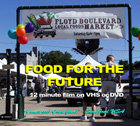
Food for the Future: The Story of the Floyd Boulevard Local Foods Market 2005
Distributed by Local Harvest, #6543 Hancock Road, Montague, MI 49437; 231-893-3937
Produced by West Michigan Center for Economic Security
Directed by Chris Bedford
VHS, color, 12 min.
Sr. High - Adult
Agriculture, American Studies, Business, Food, Sociology
Date Entered: 05/27/2005
Reviewed by Meghann Matwichuk, Morris Library, University of DelawareFood for tbe Future documents the successful upstart of the Floyd Boulevard Local Foods Market in Sioux City, Iowa. The first segment provides background information on recent trends in Iowa's agricultural economy. Despite record harvests, industrial farmers' net income is flat and profits are spent maintaining production levels. 7,000 small farms have been lost within a five-year time period. Those surviving face growing dependence on commodity contracts and increased pressure towards mass animal production and consolidation. These facts build to the stunning conclusion that the second largest agricultural economy in the nation can not feed itself; 90% of all food to the Sioux City area is imported.
In response to this growing disparity, a group of consumers and farmers began discussing ways to make local food sources available to the community. Sustainable Food For Siouxland (SFFS) is formed, and its first market of humanely raised meat and organic produce takes place in May 2004. Small farmers bringing their produce to the SFFS market forgo the use of pesticides, herbicides, and do not sell antibiotic-fed meat. Verification of welfare standards is an important part of the SFFS's ethos. Residents of Siouxland flock to the communal atmosphere of the market for a number of reasons. These include concerns about the health effects of mass-produced foods and chemical processes, a desire to support a local business initiative, and the belief that they are buying a better-tasting product.
The story of the Floyd Boulevard Market is told via interviews with customers, SFFS board members, and dieticians. Through the multiple viewpoints expressed, the viewer gains a sense of how an economic revival (or, rather, a "consumer revolution") takes place. Footage of the market shows a vital gathering of individuals celebrating the importance of food and community, reaping the benefit of SFFS's hard work. This short program would be useful for those studying sustainable business and agriculture as well as community development. It is an eye-opening look at the progress that can be made when a group of committed citizens sets out to solve a problem.